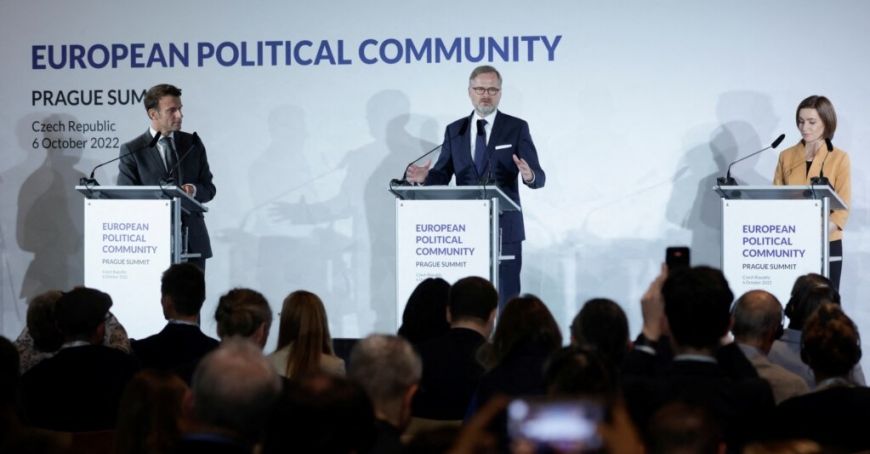The importance of the European Political Community for Moldova

Author: Cristina Rotari, intern within the #Bethechange internship program, implemented by Institute for European Policies and Reforms (IPRE).
On Europe day, at the European Parliament, French President Emmanuel Macron called for a new space for political cooperation. This platform, referred to as European Political Community (EPC), would represent a space for ‘European nations’ to consolidate a common ground for coordinating their policies and promote political dialogue for addressing issues of common concern.
Macron presented his idea with a reference to President Mitterrand’s 1989 plan of creating a European Confederation, which, albeit failed, posed the fundamental question of finding a more inclusive political format on the continent beyond the EU. Later on, EU Council President Michel endorsed the idea, envisioning a community ‘from Reykjavik to Baku or Yerevan, from Oslo to Ankara’. Therefore, EPC would encompass EU and European Economic Area (EEA) states, aspiring and candidate status counties, within which is Moldova, other active EaP countries, as well as Israel, the United Kingdom, and Turkey, – a total of 44 states.
On the 6 October, we marked the solidification of this idea, as today in Prague takes place the inaugural meeting of the European Political Community. At a fundamental level, the scope of EPC is the materialization of the ‘Wider Europe’ concept, which represents the reshaping of the boundaries of Europe as a geographical space and as a cooperation platform. Moreover, it seeks the restructuring of the EU’s relationships with its neighborhood amidst the geopolitical emergency on the continent.
When exploring the nature of the actual content of the organization, there is a certain level of ambiguity to it. The latter is usually packed around concepts such as cooperation in the realms of security and stability, energy, the economy, and mobility, but a more concrete and clear understanding of the program and the functioning of the EPC is still uncertain. However, most probably, in the short term, the key priority of the Community would be to provide a space to discuss the challenges and threats posed by Russia. The worsening energy crisis could be a recurring theme as well.
Although the main issues raised at hand are of direct interest to Moldova, the latter should also keep a level of flexibility, since the structure and nature of the community are still unsettled. Thus, having an adaptable and adjustable policy toward EPC would maximize Moldova’s gains in the short and medium terms, until the structure gets its own character and distinctiveness.
At the initial stage of the proposal of the EPC, there were some concerns, raised by the invited aspiring countries, that it could simply become an alternative to EU accession and thus stagnate the process of integration of the candidate state countries, including Moldova. This followed quickly with assurance emphasizing that EPC will not be a replacement for EU enlargement. The European Council’s conclusions on it clearly state that this Community shouldn’t do anything to undermine the EU or the process of enlargement.
Therefore, EPC would not be, and should not be, seen as a substitute for EU accession, but should be rather seen as a complementary and harmonizing tool to the aspiring countries that would help and assist them on their path to membership.
Therefore, Moldova’s overriding goal in regards to this initiative should be ultimately seen as an additional tool to advance its position in regards to its efforts towards obtaining EU membership. The participation in the community would not represent necessarily a faster accession process, as this would require systemic changes in the enlargement policies of the EU, but Moldova’s participation in the community would ultimately foster further cooperation and assistance in reform enacting.
Another point of Moldova’s interest would be drawn up from the diverse nature of the European Political Community. In this regard, even though the priority of Moldova will be to seek closer ties within EU member states and institutions, the arising opportunity of building new or closer partnerships among members of EPC shouldn’t be missed out. In this sense, even if the priority of the Republic of Moldova will be to promote and maintain close relations with EU states and institutions, the opportunity to create new partnerships and to strengthen regional dialogue with the countries of Eastern Europe and the Western Balkans should not be missed.
In conclusion, the European Political Community is an attractive initiative that has potential, given the challenges posed by the multiple crises facing the European continent. The hosting by the Republic of Moldova of the next meeting of the CPE summit in 2023 will represent a far-reaching event, which can help our country promote its main foreign policy objectives and strengthen its diplomatic relations with CPE member countries. At the same time, CPE can represent an important advocacy platform for the authorities of the Republic of Moldova in the context of the initiation of EU accession negotiations. However, in order to capitalize on these opportunities, it is necessary to advance the framework of reforms and infrastructure projects at the national level, especially on the dimensions of the rule of law, energy and security.
This blog opinion is signed by Cristina Rotari, intern within the #Bethechange 2022 program, within the IPRE project “Change starts with you! – #BetheChange: Youth for the Europeanization of the Republic of Moldova”, implemented in cooperation with the Hanns Seidel Foundation in the Republic of Moldova and with the financial support of the Federal Ministry of Foreign Affairs of Germany. The opinions expressed in this document belong to the author and do not necessarily coincide with the position of the implementing parties.

